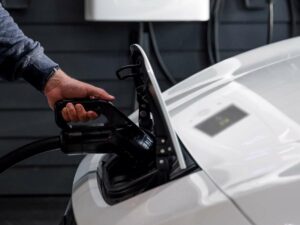The requirements for eco-friendly mobility and the desire to positively enhance the company’s image make electric vehicles increasingly relevant for fleets. A recent analysis by the data specialist Dataforce supports this with numbers: In the fleet market, the number of registrations for purely electric cars in May 2023 nearly doubled compared to the same month last year. With a market share of 19.9%, they reach their highest share in company cars to date.
To ensure the successful electrification of the fleet, companies should create a so-called E-Car Policy. This article explores what such a company car policy for electric vehicles should consider.
What is an E-Car Policy?
An E-Car Policy is a specific company car guideline that defines all the rules for the acquisition and use of electric vehicles in the company’s own fleet. The rules and obligations set forth in it apply to the company and all drivers. The E-Car Policy can be created as a standalone guideline or incorporated within a general Car Policy as a central set of rules.
What aspects should be covered in a Car Policy for electric vehicles?
The specific contents of an E-Car Policy can vary depending on the specific requirements, goals, and guidelines of each company. Therefore, it is important to tailor the company car policy to the individual needs and circumstances of the electric fleet. Some general aspects that should be considered in an E-Car Policy include the following points, which we will discuss in more detail in the following sections.
Purchase of electric vehicles
Before rules for the use of electric vehicles in the fleet can be established, guidelines for the acquisition, equipment, and subsequent modifications of the vehicles should be defined in an E-Car Policy. The policy should therefore set specific requirements for the selection of electric vehicles, such as preferred vehicle models or brands, range, charging infrastructure compatibility, or battery capacity and charging power.
Charging options and calculation of charging costs
Charging electric vehicles can be done on the go, at the workplace, or at home. Therefore, the E-Car Policy should define the options available to drivers and how the charging costs are billed, especially when the car is charged at home, for example, using a domestic wallbox. The E-Fleet Directive also specifies the type of charging stations provided at the company’s location or other sites and how access to public charging stations is regulated.
Charging at the Company Location
For workplace charging, there can be time restrictions and different charging rates. In most cases, charging for drivers on the company premises is often free of charge and tax-free. Electric vehicles with short downtime may require corresponding fast-charging points to charge the vehicle on time.
Charging at Home
For home charging, the purchase of a wallbox and the billing of charging costs must be clearly regulated. Many companies cover the costs of purchasing and installing a wallbox or provide their employees with a charging station through a leasing model. The billing of electricity costs can be done on a flat rate basis or precisely by kWh using a separate electricity meter.

Insurance and Liability
Like a conventional combustion engine vehicle, an electric vehicle also requires motor vehicle insurance and, if applicable, comprehensive insurance. However, the battery drive has an impact on the risk assessment. Although the safety of batteries continuously improves, operator errors during charging or improper handling can lead to short circuits, electric shocks, and damage to the vehicle. Therefore, it is important for the company to have a disclaimer of liability towards the company car drivers. Otherwise, the company may be held liable if a faulty charging process leads to a short circuit and subsequently to a fire. The extent to which drivers of electric vehicles are involved in self-inflicted accidents is also clearly regulated in the E-Car Policy.
Dynamics of Car Policies for E-Vehicles
The development of electric cars is advancing rapidly; models are continuously evolving, and ranges are steadily improving. Therefore, flexibility and dynamism are essential in an E-Car Policy to keep pace with changing conditions.
A Car Policy for the gradual transition to electromobility
A Car Policy is an essential tool to make a significant contribution to more climate and environmental protection in the fleet. Thanks to it, clear guidelines and goals for reducing harmful emissions can be established for a more environmentally friendly fleet. Companies can set a CO2 limit in the Car Policy, achievable only through a high proportion of electric vehicles. Alternatively, drivers can choose only from different electric vehicle models when acquiring new company cars. A bonus-malus system, for example, can reward employees with a higher leasing rate subsidy for opting for a low-emission vehicle. Alternatively, drivers can choose better features by selecting a more environmentally friendly model.
Testing electric vehicles?
With a car subscription, you can test whether an electric car is suitable for your fleet without obligation. No hidden costs and starting from a one-month duration.
The most important information about the Car Policy for electric vehicles
An E-Car policy encompasses all obligations and rights related to the acquisition and use of electric vehicles in the company's own fleet.
Access to charging facilities and the billing of electricity costs should be clearly regulated in a car policy.
Through a liability disclaimer, companies can minimize their own liability risks, especially in the event of a fire caused by incorrect charging.
Additional fleet management knowledge
If you enjoyed this post and would like to know more on this topic, we recommend these articles.




